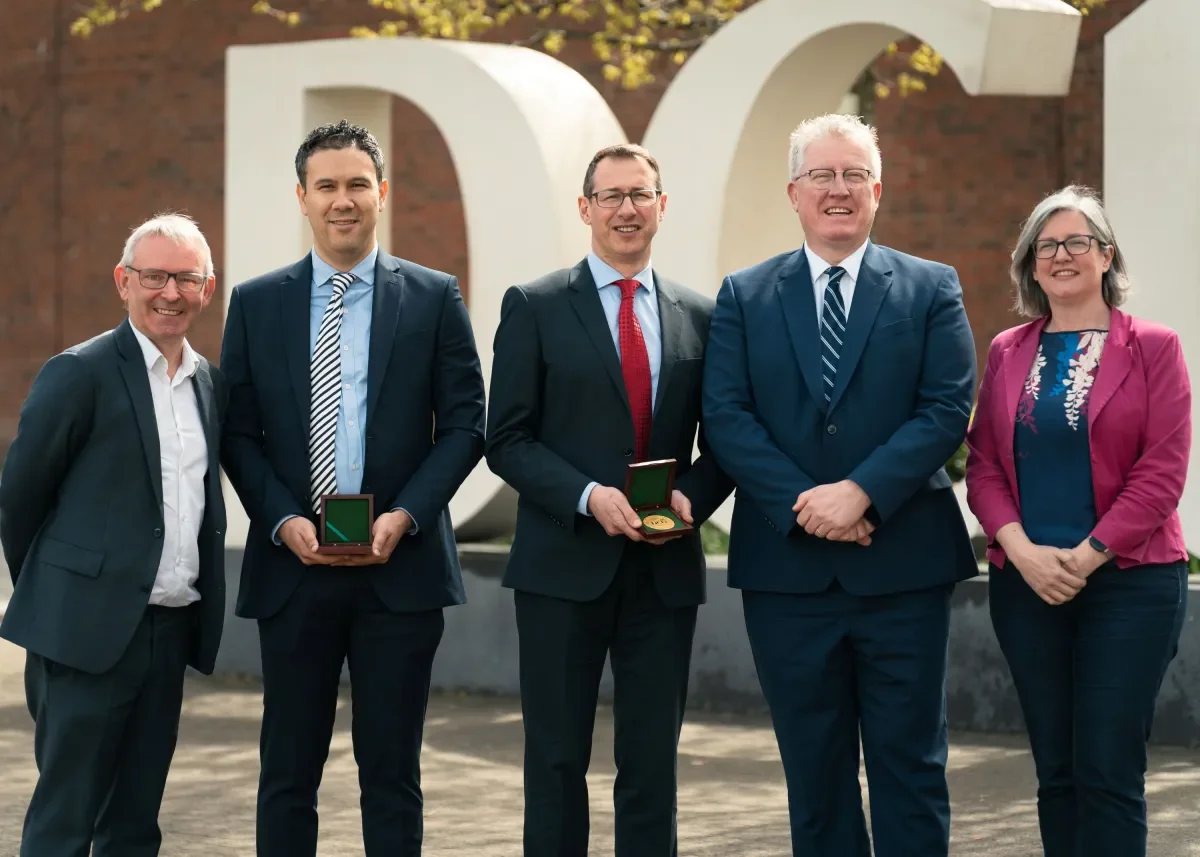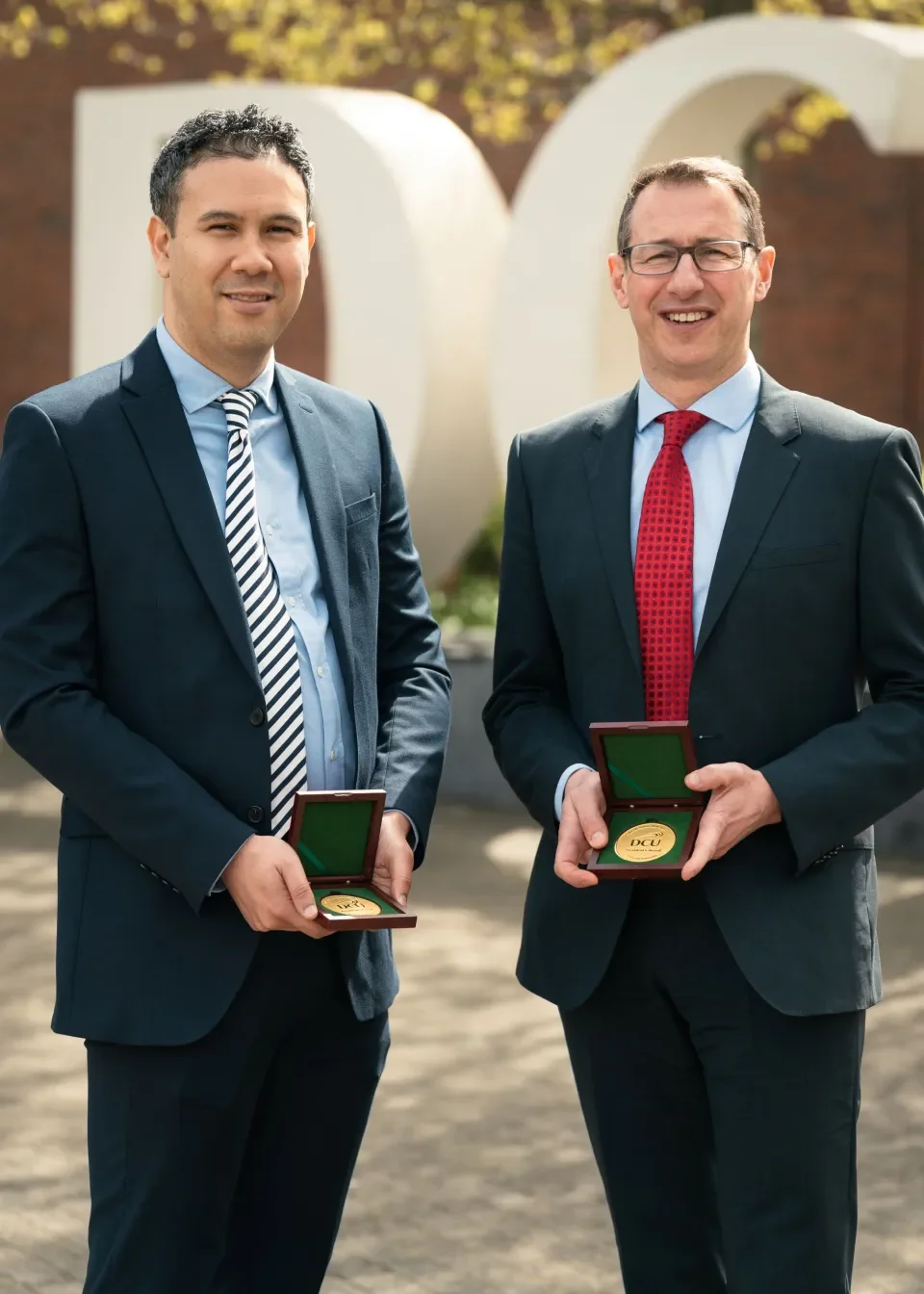
Research Newsletter - Issue 93: Spotlight

Prof. John Doyle, Dr Danny Marks, Prof. Nicholas Dunne, Prof. Dáire Keogh, Prof. Blánaid White
President's Awards for Research and Research Impact 2024
April 2024
The annual President’s Awards for Research recognise researchers with sustained contributions in their field, those making impact early in their careers, as well as the most stand alone innovative projects.
As the university embarks on its new strategy, which includes specific outcomes for research communications and increased citations, the awards’ focus is all the more relevant.
This year there are three awardees across three categories, hailing from three different faculties.
Vice President for Research, Prof John Doyle said:
“Congratulations to Prof. Dunne, Dr Hopper and Dr Marks on their awards. Their dedication to applied research and expanding knowledge to meet global challenges is inspiring. Almost a year on from the launch of the university’s strategic plan, we have made progress against ambitious targets for research. However, today represents a chance to look past the numbers and bring it back to the human level, and put three faces to some excellent research.”
President’s Research Award for Early Career Staff
Awardee: Dr Danny Marks, School of Law & Government
Dr Danny Marks’ research focuses on evaluating the efficacy of climate adaptation governance, inequality and climate change, as well as the efficacy of natural and man made interventions
During his acceptance speech Dr Marks spoke about his love for Southeast Asia, Thailand in particular, as well as his dismay at the uneven effects of climate change on the most impoverished.
His research often uses a political ecology approach, whereby he analyses how local practices, policies, and discourses affect local-level socio-environmental outcomes. His analyses of cause and effect seek to challenge simplistic narratives which shift blame for environmental issues from powerful corporations and political figures.
Dr Marks is also taking a leading role in several major ongoing research projects, including an innovative EPA funded grant where he and Dr Darren Clarke from the School of History and Geography are assessing Ireland’s current climate adaptation policy. Danny has also secured funding on a grant examining the proliferation of nature based carbon sinks in Southeast Asia.
The most effective approach to mitigating climate change involves a combination of reducing greenhouse gas emissions and enhancing carbon sequestration in vegetation and organic-rich substrates and soils, known as nature based carbon sinks. Due to its climate and topography, Southeast Asia holds significant potential for increased carbon sequestration in this manner.

Dr Danny Marks and Prof. Nicholas Dunne
The President's Award for Research for Early Career Staff and the President's Award for Research for Academic Staff were awarded to Dr Danny Marks (School of Law & Government) and to Prof. Nicholas Dunne (School of Mechanical & Manufacturing Engineering) during today's ceremony.
Dr Louise Hopper was awarded the President's Award for Research Impact in absentia.
Presidents Research Award for Academic Staff
Awardee: Professor Nicholas Dunne, School of Mechanical and Manufacturing Engineering
The President’s Research Award for Academic Staff recognises outstanding achievements and research excellence over an extended period of time. This year’s award goes to Professor Nicholas Dunne.
Prof. Dunne’s international collaborative research programmes, involving academia, industry and clinicians, have significantly impacted biomaterials and medical device technology advancements. Through publications on materials development, scaled-up manufacture, in vitro/in vivo assessment, and clinical translation, his research has enhanced orthopaedic practices globally, improving surgical outcomes and fostering innovation in additive manufacturing. Moreover, his work in non-viral gene delivery and biomaterial development has catalysed clinical breakthroughs in bone repair and gene therapy, attracting substantial investment and recognition.
Prof. Dunne's leadership at Biodesign Europe has significantly contributed to driving internal collaboration, formation of research clusters, implementing research strategy, and advancement of DCU’s open research agenda. Recently, a product of the organisation’s long standing collaboration with Irish medical device firm PBC Biomed received FDA breakthrough status, signifying it is superior to most commercially available products on the market. This new bioadhesive designed to treat bone fractures less invasively and with superior results is just one example of the significant research Prof Dunne has led.
In his acceptance speech, Nicholas spoke about the importance of having a core theme or ‘spine’ in one’s research. Drawing on key achievements career, he touched on market leading biomaterial products, one of which he developed during his PhD, as well as ongoing collaborations with PBC Biomed and the Phion collaboration with Queens Belfast.
Awardee: Dr Louise Hopper, School of Psychology
The purpose of the President’s Research Impact Award is to recognise and reward those whose research at DCU has led to excellent impact outside of academia. This year, Dr Louise Hopper is recognised for her work in dementia and ageing.
Dr Louise Hopper's research has focused on quality of life for older adults, particularly those with dementia, as well as the ethical use of health data. She has taken a dynamic approach incorporating psychosocial, technology and eHealth interventions.
Dr Hopper’s work has had significant academic recognition, both in terms of research funding and subsequent citations. Louise has been awarded, over 600,000 in competitive funding and authored over thirty five peer reviewed publications, accumulating over a thousand citations. In addition, she has authored reports for the HSE and the Department of Health, including instrumental work on the National Dementia Registry.
Engaging with industry nationally and internationally, Dr Hopper has sought to use technological solutions to complex issues. The INTenSE project addresses the lack of consistency in specialised dementia education across Europe. It focuses on educating health and social care professionals using ICT learning tools such augmented reality programmes which allow people to experience simulated symptoms of dementia.
The CAPTAIN project focused on creating a non-invasive virtual coaching system to address age-related challenges for independent living. The project developed an ambient tech solution where participants interacted with a CAPTAIN virtual coach, projected onto surfaces within the home.
